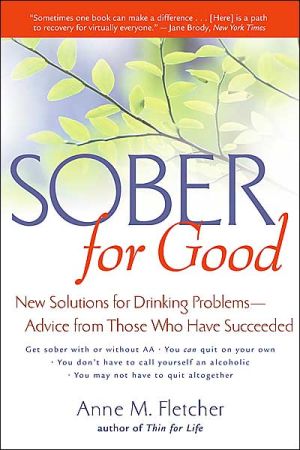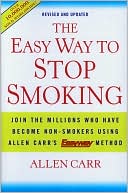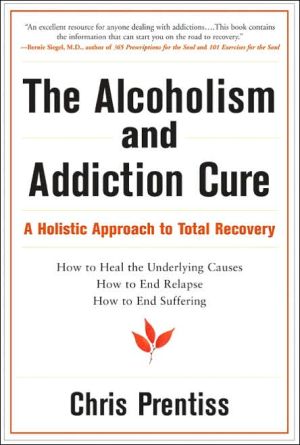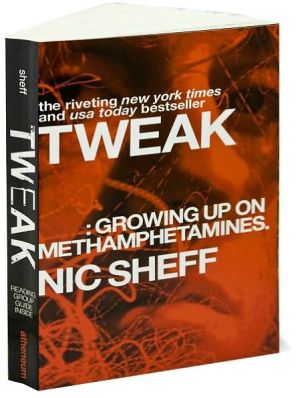Sober for Good: New Solutions for Drinking Problems -- Advice from Those Who Have Succeeded
Finally someone has gone straight to the real experts: hundreds of men and women who have resolved a drinking problem. The best-selling author Anne M. Fletcher asked them a simple question: how did you do it? The result is the first completely unbiased guide for problem drinkers, one that shatters long-held assumptions about alcohol recovery.\ Myth: AA is the only way to get sober.\ Reality: More than half the people Fletcher surveyed recovered without AA.\ Myth: You can't get sober on your...
Search in google:
A New Look at How People Really Solve Drinking Problems If your best friend turned to you for advice about a drinking problem, what would you say? The automatic reaction of most people, nonprofessionals and treatment specialists alike, would likely be "Get yourself to AA." But is this truly the best response for that individual is it the only solution? We've all heard so many things about recovery, but are they really true? To find out how people whose lives have been troubled by alcohol have overcome their difficulties, I decided to turn to the foremost experts those who have actually done it, people who have mastered their former alcohol problems in different ways. I wanted to determine exactly what these "masters" did what specific strategies they used to get sober and stay sober. My call for information was answered by hundreds whose drinking at its worst ranged from what many of us might define as a social drinker's quota to more than a fifth of hard liquor a day. (All of the 222 masters completed a seven-page questionnaire about their drinking pasts, the turning points, how they resolved their alcohol problems, and how they got on with their lives.) Who Are the Masters? The masters came to me through postage-paid flyers distributed in public places across the country, advertisements and listings in newspapers and special-interest magazines, postings on the Internet, and recovery groups. Some masters knew me or had heard about my work through a friend. They come from all walks of life they're attorneys, maintenance workers, former topless dancers, college professors, physicians, schoolteachers, homemakers, engineers, judges, former bartenders, current bartenders, nurses, and journalists. They're Christians and atheists, gay and straight, people from their twenties to their eighties who got sober anywhere from their teens through their fifties and sixties. They include husbands and wives who got sober together as well as a mother and her two grown children who all quit on their own but at different times. A quarter of them are recovery group leaders, mental health professionals, and/or chemical dependency counselors, so they know sobriety from both ends, as former problem drinkers and as experienced helpers of those who are still struggling. Gender-wise, there is close to an even split: 54 percent of the masters are men and 46 percent are women. Along with stories of people who were rendered destitute because of their drinking, I wanted to include the experiences of people with mild or moderate alcohol problems, because little help is available for them, despite the fact that they are thought to outnumber stereotypical brown-bag "alcoholics" by three or four to one. Therefore, the stories of the masters' drinking days vary from sagas of high-functioning drinkers who were able to raise families and move upward professionally despite their alcohol abuse to those of hard-core "drunks" who describe loss of jobs, health, children, and dignity. The masters' drinking at its worst ranged from a reported three to five daily drinks for some people up to two daily quarts of vodka for one man. At the lower end of the scale, Janet C. (who believes she was "chiefly mentally addicted" to alcohol but considers herself to be an "alcoholic" nonetheless) typically had two or three single-shot martinis before dinner and one or two scotches with soda afterward -- surely beyond healthy drinking, but not what most people think of when they picture the stereotypical "alcoholic." Although she felt that her drinking kept her from being a good parent to her two teenagers, she was always responsible enough to know that she "didn't dare drive" them around in the evenings. At the other extreme, the two-quart-a-day vodka drinker, George M., attributes all of the following to his drinking: "My wife left me; I lost my career, my possessions, my teeth, and much of my eyesight; my friends disappeared. I lived in a spare bedroom in my mother's house, soiled the bed often, had drunk driving and disorderly conduct arrests, and was suicidal." (With the help of AA, he has been sober for more than five years now.) Like George, a number of other masters once abused drugs such as marijuana and cocaine in addition to alcohol. For all but five of them, alcohol was the drug of choice. Nearly all of the masters have been continuously sober for five or more years;* the average length of sobriety for the entire group is just over thirteen years. Two thirds of them have at least a decade of sobriety. Sobriety Means Different Things to Different People For most of the masters, sobriety is synonymous with abstinence. For the vast majority, abstinence turns out to be the best policy: nine out of ten are totally abstinent. Others have a small amount of alcohol on very rare occasions - - say, when making a toast at a wedding reception. About one out of ten of the masters are near-abstinent, occasional, or moderate drinkers, which challenges the notion that one sip of alcohol will lead you back to full-blown "alcoholism." For serious problem drinkers and those who are already contentedly abstinent, however, consuming any alcohol can be a risky proposition. While most people think of sobriety as total abstinence, Webster's Tenth Collegiate Dictionary defines "sober" not as "abstinent" but as "1 a: sparing in the use of food and drink: abstemious. b: not addicted to intoxicating drink. c: not drunk . . . 4. marked by temperance, moderation, or seriousness." The masters whom I call sober, then, are those who have resolved their alcohol problems and gotten on top of their drinking, usually through abstinence but sometimes through moderate or occasional drinking. I sought the masters' help in answering such questions as these: How important is it to admit to yourself and others that you are an "alcoholic"? Can you recover and stay recovered without going to a recovery group? If you get sober with the help of a recovery group, do you have to keep going forever? What about treatment at places like the Betty Ford Center and hospital alcohol programs is it necessary? Where do you turn if you have issues about your drinking but don't really feel you're an "alcoholic"? Is it true that you have to "hit bottom" in order to become motivated to deal with a drinking problem? Before taking action, are most people "in denial" about their drinking problems? Do you wake up one morning and say, "That's it: I quit"? If so, what gets you to that point, and does everything else in life just kind of fall into place afterward? Is it helpful to see yourself as forever recovering, or can you at some point think of yourself as recovered or cured? Is it true that having just a small amount of alcohol will send you right back to where you left off in your drinking, or is having an occasional drink a possibility for some people? What if you don't have strong religious or spiritual beliefs, such as faith in a "higher power" can you still get sober? Do you eventually lose your longing for alcohol, or do you pine for it forever? I had some of my own thoughts about these matters, since over the years I have coped with and resolved my own issues with drinking. But I wanted to find out what others who once struggled with alcohol had to say. What I learned from these masters is striking, and much of what they relate flies in the face of what we've been led to believe about "alcoholism." Sober for Good examines the common threads among recovery stories of people who have resolved drinking problems in many different ways. A good deal of what the masters share about their triumphs over alcohol is supported by findings of experts whose research doesn't always make its way to the general public. I've interwoven these scientific findings with my discoveries about the masters. Whether a drinking problem is serious or occasionally troublesome, the wisdom of the Sober for Good masters can help. These people offer possible solutions for those who are just wondering whether they have a drinking problem as well as for anyone who is ready to take action. They offer hope for anyone who is discouraged by the conventional route to recovery, who's looking for something different. If you're dealing with a loved one who has problems with alcohol, the words of the masters can offer insight for you as well. (Chapter 7 is specifically for family and friends of problem drinkers.) The masters' stories show that the road to sobriety does not always have a finite course ending in storybook abstinence. They suggest that recovery takes various shapes and forms as well as twists and turns over time and can be marked by interludes of drinking again all in the context of a serious effort to keep drinking from interfering with a happy, functional life. Sobriety Is More Than Not Drinking The masters' stories reveal that achieving sobriety involves much more than abandoning problem drinking it's about taking active steps to achieve a new plane of living, to build a life with no room for alcohol abuse. Ward R. (twenty-four years) says his "last drunk" made him realize he had two choices: "I could either work on developing a way of life in which I didn't want to drink, or I could say 'To hell with it' and continue drinking until I died." Ward made his choice by going to AA but using it in an unconventional way and by developing a life that has no room for drinking. He explains, "I am now retired and my life is full with traveling to other countries, exploring other cultures, being an active member of AARP, working on helping other seniors deal with telemarketing con artists, planning on being a volunteer deputy sheriff, being a member of a gun club, working with other recovering alcoholics, learning how to use the Internet, and remodeling a fixer- upper house I bought. I just don't have time to sit in a tavern or bar." Marisa S. (seven years, with the help of Women for Sobriety) says, "Without alcohol, I can be the person I want to be. I have gotten back into my career and have done extremely well, become passionate about my gardening and landscaping, started traveling for pleasure. I can answer the phone or the door without worrying whether I'll give myself away 'Am I too drunk?' or 'Will people notice?'" Paul V. (nine years, through AA) says, "Since I resolved my drinking problem, there isn't really an area of my life that has been unchanged. I quadrupled my income, I became an avid hunter, I am far less moody, and my relationship with God is in good order. My perceptions of everything are better." Roxi V. (six years, with the help primarily of Secular Organizations for Sobriety but also AA) says, "I am happy and celebrate every day of my sobriety. I am a well woman." Roxi quit drinking in her mid- forties and since has gone back to school and gotten her M.S. degree. Best of all, she states, "I've grown as a person. I've become and am becoming the real Roxi, and I like me." As Regina S. says, the masters have "built a life where drinking doesn't fit in." These are their stories. A. Thomas Horvath . . . This is a comprehensive overview — a highly informative, scientifically accurate, and inspiring account of recovery in its many manifestations.
1 A New Look at How People Really Solve Drinking Problems If your best friend turned to you for advice about a drinking problem, what would you say? The automatic reaction of most people, nonprofessionals and treatment specialists alike, would likely be “Get yourself to AA.” But is this truly the best response for that individual — is it the only solution? We’ve all heard so many things about recovery, but are they really true?\ To find out how people whose lives have been troubled by alcohol have overcome their difficulties, I decided to turn to the foremost experts — those who have actually done it, people who have mastered their former alcohol problems in different ways.* I wanted to determine exactly what these “masters” did — what specific strategies they used — to get sober and stay sober. My call for information was answered by hundreds whose drinking at its worst ranged from what many of us might define as a social drinker’s quota to more than a fifth of hard liquor a day. (All of the 222 masters completed a seven-page questionnaire about their drinking pasts, the turning points, how they resolved their alcohol problems, and how they got on with their lives.) Who Are the Masters?\ The masters came to me through postage-paid flyers distributed in public places across the country, advertisements and listings in newspapers and special-interest magazines, postings on the Internet, and recovery groups. Some masters knew me or had heard about my work through a friend.\ They come from all walks of life — they’re attorneys, maintenance workers, former topless dancers, college professors, physicians,schoolteachers, homemakers, engineers, judges, former bartenders, current bartenders, nurses, and journalists. They’re Christians and atheists, gay and straight, people from their twenties to their eighties who got sober anywhere from their teens through their fifties and sixties. They include husbands and wives who got sober together as well as a mother and her two grown children who all quit on their own but at different times. A quarter of them are recovery group leaders, mental health professionals, and/or chemical dependency counselors, so they know sobriety from both ends, as former problem drinkers and as experienced helpers of those who are still struggling. Gender-wise, there is close to an even split: 54 percent of the masters are men and 46 percent are women.\ Along with stories of people who were rendered destitute because of their drinking, I wanted to include the experiences of people with mild or moderate alcohol problems, because little help is available for them, despite the fact that they are thought to outnumber stereotypical brown-bag “alcoholics” by three or four to one. Therefore, the stories of the masters’ drinking days vary from sagas of high-functioning drinkers who were able to raise families and move upward professionally despite their alcohol abuse to those of hard-core “drunks” who describe loss of jobs, health, children, and dignity. The masters’ drinking at its worst ranged from a reported three to five daily drinks for some people up to two daily quarts of vodka for one man.\ At the lower end of the scale, Janet C. (who believes she was “chiefly mentally addicted” to alcohol but considers herself to be an “alcoholic” nonetheless) typically had two or three single-shot martinis before dinner and one or two scotches with soda afterward — surely beyond healthy drinking, but not what most people think of when they picture the stereotypical “alcoholic.” Although she felt that her drinking kept her from being a good parent to her two teenagers, she was always responsible enough to know that she “didn’t dare drive” them around in the evenings.\ At the other extreme, the two-quart-a-day vodka drinker, George M., attributes all of the following to his drinking: “My wife left me; I lost my career, my possessions, my teeth, and much of my eyesight; my friends disappeared. I lived in a spare bedroom in my mother’s house, soiled the bed often, had drunk driving and disorderly conduct arrests, and was suicidal.” (With the help of AA, he has been sober for more than five years now.) Like George, a number of other masters once abused drugs such as marijuana and cocaine in addition to alcohol. For all but five of them, alcohol was the drug of choice.\ Nearly all of the masters have been continuously sober for five or more years;* the average length of sobriety for the entire group is just over thirteen years. Two thirds of them have at least a decade of sobriety.\ Sobriety Means Different Things to Different People For most of the masters, sobriety is synonymous with abstinence. For the vast majority, abstinence turns out to be the best policy: nine out of ten are totally abstinent.\ Others have a small amount of alcohol on very rare occasions - - sssssay, when making a toast at a wedding reception. About one out of ten of the masters are near-abstinent, occasional, or moderate drinkers, which challenges the notion that one sip of alcohol will lead you back to full-blown “alcoholism.” For serious problem drinkers and those who are already contentedly abstinent, however, consuming any alcohol can be a risky proposition.\ While most people think of sobriety as total abstinence, Webster’s Tenth Collegiate Dictionary defines “sober” not as “abstinent” but as “1 a: sparing in the use of food and drink: abstemious. b: not addicted to intoxicating drink. c: not drunk . . . 4. marked by temperance, moderation, or seriousness.” The masters whom I call sober, then, are those who have resolved their alcohol problems and gotten on top of their drinking, usually through abstinence but sometimes through moderate or occasional drinking.\ I sought the masters’ help in answering such questions as these: How important is it to admit to yourself and others that you are an “alcoholic”?\ Can you recover — and stay recovered — without going to a recovery group?\ If you get sober with the help of a recovery group, do you have to keep going forever?\ What about treatment at places like the Betty Ford Center and hospital alcohol programs — is it necessary?\ Where do you turn if you have issues about your drinking but don’t really feel you’re an “alcoholic”?\ Is it true that you have to “hit bottom” in order to become motivated to deal with a drinking problem?\ Before taking action, are most people “in denial” about their drinking problems?\ Do you wake up one morning and say, “That’s it: I quit”? If so, what gets you to that point, and does everything else in life just kind of fall into place afterward?\ Is it helpful to see yourself as forever recovering, or can you at some point think of yourself as recovered or cured?\ Is it true that having just a small amount of alcohol will send you right back to where you left off in your drinking, or is having an occasional drink a possibility for some people?\ What if you don’t have strong religious or spiritual beliefs, such as faith in a “higher power” — can you still get sober?\ Do you eventually lose your longing for alcohol, or do you pine for it forever?\ I had some of my own thoughts about these matters, since over the years I have coped with and resolved my own issues with drinking. But I wanted to find out what others who once struggled with alcohol had to say. What I learned from these masters is striking, and much of what they relate flies in the face of what we’ve been led to believe about “alcoholism.&#
AcknowledgmentsviForewordxvIntroductionxix1A New Look at How People Really Solve Drinking Problems12There's Not Just One Way: How the Masters Got Sober--and Stay Sober83It's Not How Much You Drink: How the Masters Faced Up to Their Alcohol Problems264You Don't Have to "Hit Bottom": How the Masters Reached the Turning Point485It's Not Necessarily One Day at a Time: How the Masters Made a Commitment to Sobriety756Be Your Own Expert: How Seven Different Masters Found Their Way with Seven Different Approaches967You Can Help: The Masters' Advice to Family and Friends1468One Drink Does Not a Drunk Make: How the Masters Determined Whether They Could Ever Drink Again1709It's Not Enough Just to Stop Drinking: How the Masters Deal with Life's Ups and Downs Without Alcohol19310Recall the Past, Live in the Present: How the Masters Stay Motivated21711With or Without a "Higher Power": How the Masters Handle Spirituality23512There's Nothing Missing: How the Masters Find Joy Without Alcohol247AppendixA Consumer Guide to Recovery Options267Selected References303Index311
\ From Barnes & NobleJust as each individual drinking problem is unique -- differing from others in severity, in cause, and in an infinite number of other ways -- so, too, is each problem drinker's road to recovery, according to this provocative book. Conventional wisdom dictates that in order to stop alcohol abuse one must label oneself "alcoholic," abstain from alcohol, participate in a recovery group such as AA for life, and accept the fact that the disease is incurable. Certainly, many lives have been turned around by these dictums, but author Anne Fletcher explores other ways in which people have successfully resolved drinking problems in Sober for Good. Extensive interviews with "masters" -- people who have been sober for at least five years -- reveal that the path to lasting sobriety is not always a 12-step one (although many of the profiled masters are sober through the help of AA) and that some people are able to formulate their own terms of sobriety. While this is not recommended reading for anyone in the throes of a powerful alcohol addiction, lest they abuse the book's message as an excuse to thwart recovery, it is an insightful and unusual examination of all the options available to those who truly wish to conquer a drinking problem, whether it be moderate or extreme.\ \ \ \ \ Stanton Peele"Fletcher avoids ideological pitfalls and is true to scientific research" (—Stanton Peele, Ph.D., J.D., author of Love and Addiction and The Truth About Addiction and Recovery\ \ \ New York TimesThe press kit for Anne M. Fletcher's new book, "Sober for Good," states,'Sometimes one book can make a difference.' After reading it, I could not agree more strongly.\ \ \ \ \ Nick HeatherAnne Fletcher shows a remarkably secure grasp of the most important recent developments in our understanding of problematic drinking . . .\ \ \ \ \ USA TodayThese stories are part of author Anne Fletcher's in-depth look at people who have overcome serious drinking problems ... Fletcher's main message: That there are many different ways to get and stay sober.\ \ \ \ \ G. Alan MarlattI highly recommend this book for readers who are seeking pathways to sobriety for themselves or for others . . .\ \ \ \ \ Mark B. Sobell"A compendium of hope for those who have concerns about their own drinking or that of someone close to them." (—Mark B. Sobell, Ph.D., Center for Psychological Studies, Nova Southeastern University)\ \ \ \ \ William R. MillerAnne Fletcher has assembled an impressive array of first-person accounts of how real people have resolved their alcohol problems . . .\ \ \ \ \ Barbara S. McCradyThis is a wonderful book — well written, full of hope and useful information, and positive at every turn . . .\ \ \ \ \ A. Thomas Horvath. . . This is a comprehensive overview — a highly informative, scientifically accurate, and inspiring account of recovery in its many manifestations.\ \ \ \ \ Marc F. Kern. . . This is the only balanced presentation of the state-of-the-art truths on recovery that I have ever read.\ \ \ \ \ New York TimesThe press kit for Anne M. Fletcher's new book, "Sober for Good," states,'Sometimes one book can make a difference.' After reading it, I could not agree more strongly.\ \ \ \ \ Publishers WeeklyAlthough Alcoholics Anonymous has long been the preferred (and often court-mandated) regimen for the treatment of alcoholism, its ideology isn't for everyone. As Fletcher (Thin for Life) points out, some people are put off by AA's religious tone, others by the concept of powerlessness over alcohol. And, she says, contrary to AA beliefs, many more never "hit bottom," but nonetheless choose to reconsider their relationship with drinking. Additionally, she suggests, with managed care drastically cutting coverage of inpatient treatment, people with alcohol problems need to know about outpatient alternatives to AA. Fletcher, a health and medical journalist, provides a compendium of such approaches, drawing on the voices of "masters" former problem drinkers who have resolved their problems with alcohol and been sober for at least five years. Programs such as Women for Sobriety, Rational Recovery and Moderation Management provide a variety of approaches, and the "masters" themselves offer a collection of strategies for getting and staying sober with support groups, chemical dependency counselors or a combination of treatments. Unfortunately, Fletcher draws a fuzzy line between "problem drinkers" and "alcoholics," a word she avoids because some find it "pejorative." Maintaining that the distress and dysfunction of most people with drinking problems is not as "severe" as that associated with a stereotypical drunk, she promises that, although AA proponents insist otherwise, "you can quit on your own," "you don't have to quit altogether" and "you don't have to call yourself an alcoholic." Though she sometimes appears to bash AA, Fletcher provides a useful overview of the varieties of recovery programs and practices. (Apr. 17) Copyright 2001 Cahners Business Information.\ \








